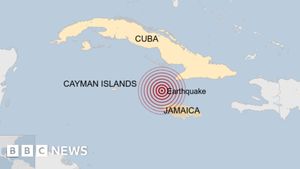Vietnam has seen increasing initiatives aimed at supporting disaster victims and local communities, driven by the spirit of collaboration and social responsibility. These efforts are particularly notable among the armed forces and local government organizations, who are stepping up to meet the needs of the most vulnerable populations.
One of the significant movements fueling this supportive atmosphere is the nationwide campaign called "Chung tay xóa nhà tạm, nhà dột nát" (Join hands to eliminate temporary and dilapidated houses) launched for 2025. This initiative has seen active participation from the Border Guard Forces (BĐBP) of various provinces, who are dedicated to addressing housing issues faced by people living near border areas. According to local reports, the BĐBP has been instrumental in fostering community connections and mobilizing resources to assist families living under challenging conditions.
At the recent launch of this campaign, Lieutenant Colonel Nguyễn Vũ Lê, Deputy Political Officer of the Tà Lùng International Border Guard Station, explained how the campaign mobilizes local leaders and citizens to identify particularly disadvantaged families. Each case is assessed to develop customized plans for support, which can include labor contributions from local troops to assist with construction, as well as financial aid totaling up to 44 million VND per household.
A telling example of the impact of these efforts can be found with the family of Đàm Thị Nguyệt in Quảng Hòa. After losing her husband, she was left to raise their two children alone in severely inadequate conditions— the dilapidated house often leaked during the rains and struggled to keep the cold out during winter months. Following the collaborative efforts of local authorities and the BĐBP, her family's dream of having a sturdy home has finally been realized. Nguyệt expressed her gratitude, saying, "Looking at this house, which I once hoped for, I am truly moved. Living conditions for my children and me have drastically improved, and we are incredibly thankful to the Border Guard and the local government for making this happen."
The broader impact of the housing initiative is distinctly felt across several communities. For example, Hoàng Văn Khầu, another recipient of assistance from the XNT, NDN project, shared how local forces had been pivotal during the construction of his new home. "We received help not only financially but through dedicated labor from the Border Guards who provided materials and manpower to build my family’s home. I am truly grateful to everyone who contributed to this effort," he stated.
This commitment to improving the living conditions of vulnerable households is mirrored by the local government's involvement. Linh Phú Cường, Secretary of the Thống Nhất commune’s Party Committee, praised the Border Guard forces, stating, "The support from the Border Guards has strengthened community ties and heightened our collective efforts toward poverty alleviation. Their annual contributions include direct labor assistance, financial support, and regular interactions with local authorities to drive development goals forward." He added, "It’s these grassroots efforts and cooperation between civilians and armed forces which lead to significant strides toward building new rural areas."
The successes achieved so far have set ambitious targets for the future. Looking to the coming years, the BĐBP aims to intensify its support, reaching additional households who are still lacking adequate housing. Officials have reported significant results, with over 1,260 out of 2,911 dilapidated homes already addressed through these initiatives. By actively promoting partnerships and encouraging community involvement, the Border Guards have expressed hope for achieving their goals of both immediate assistance and sustainable growth within rural sectors.
Meanwhile, other projects are also gaining traction across the country. Efforts are being made to support the Xơ Đăng ethnic community also face challenges, particularly those centered around cultural preservation and tourism development. The district of Tu Mơ Rông has initiated efforts to relocate families to the thôn Mô Pả area, which is undergoing renovations to facilitate tourism and promote cultural heritage preservation.
According to Võ Trung Mạnh, Chairman of the People's Committee of Tu Mơ Rông, the district has successfully raised 120 million VND from local officials, teachers, and businesses to support the development of the Mô Pả site. This initiative aims to create favorable ecosystems for native people, all the way from constructing living spaces to fostering their unique cultural heritage.
To enrich the environmental aspect of this community-centered project, the plan includes planting greenery to beautify the area, making it more conducive for cultural tourism. Local authorities and villagers are actively participating, believing this project can lead to economic growth and sustainability for the Xơ Đăng people.
With these significant initiatives, Vietnam is taking commendable steps toward addressing the challenges faced by disaster victims and marginalized communities. The commitment shown through various local programs highlights the nation’s dedication to fostering resilience and improving living conditions for its most vulnerable residents. Each project serves not only as immediate relief but as long-term investment in the country’s social fabric, aiming to uplift those who have been struggling and build communities capable of thriving alongside one another.



